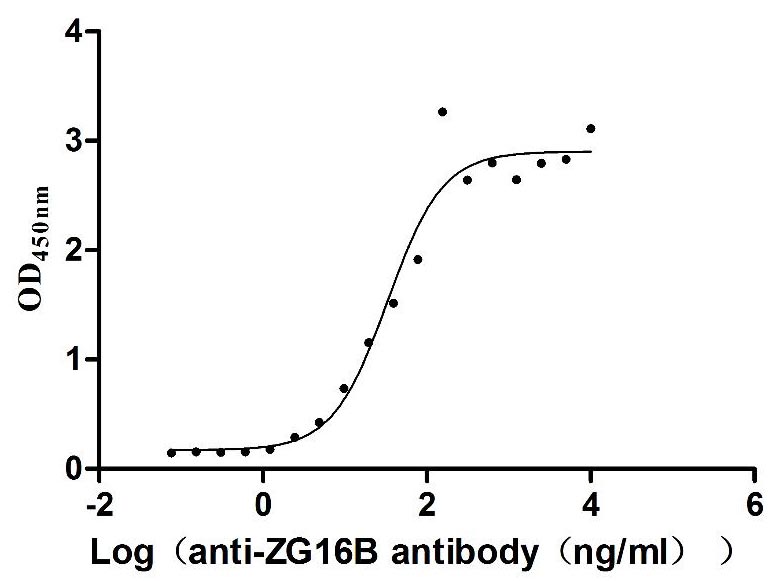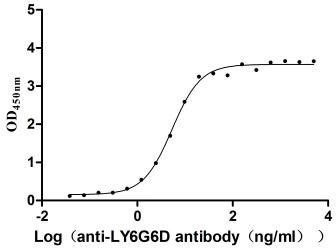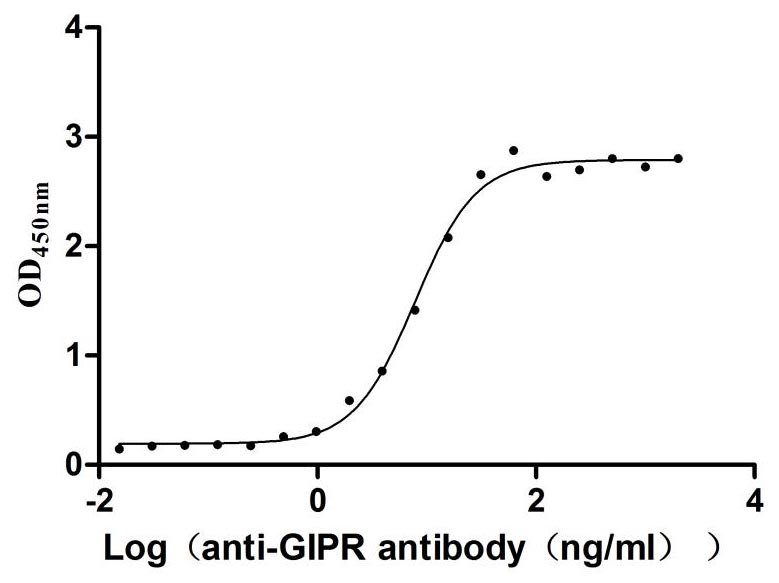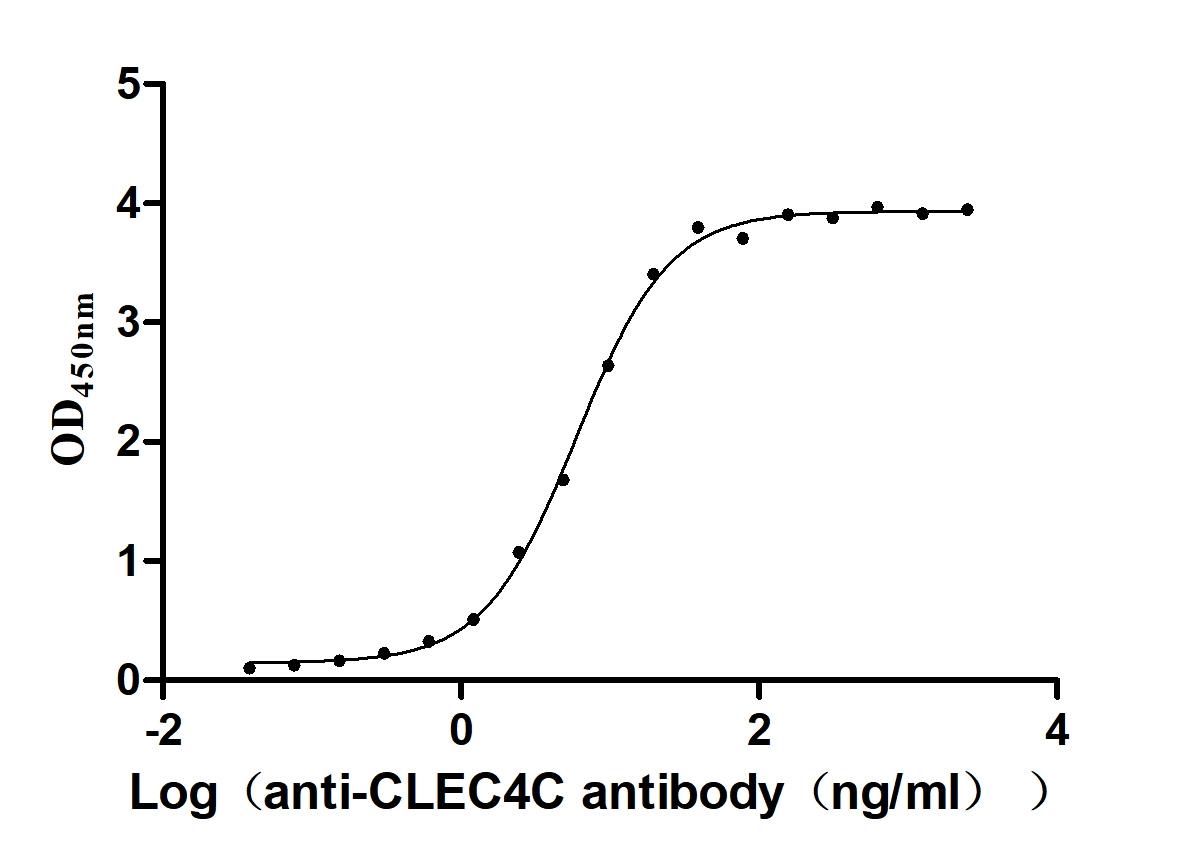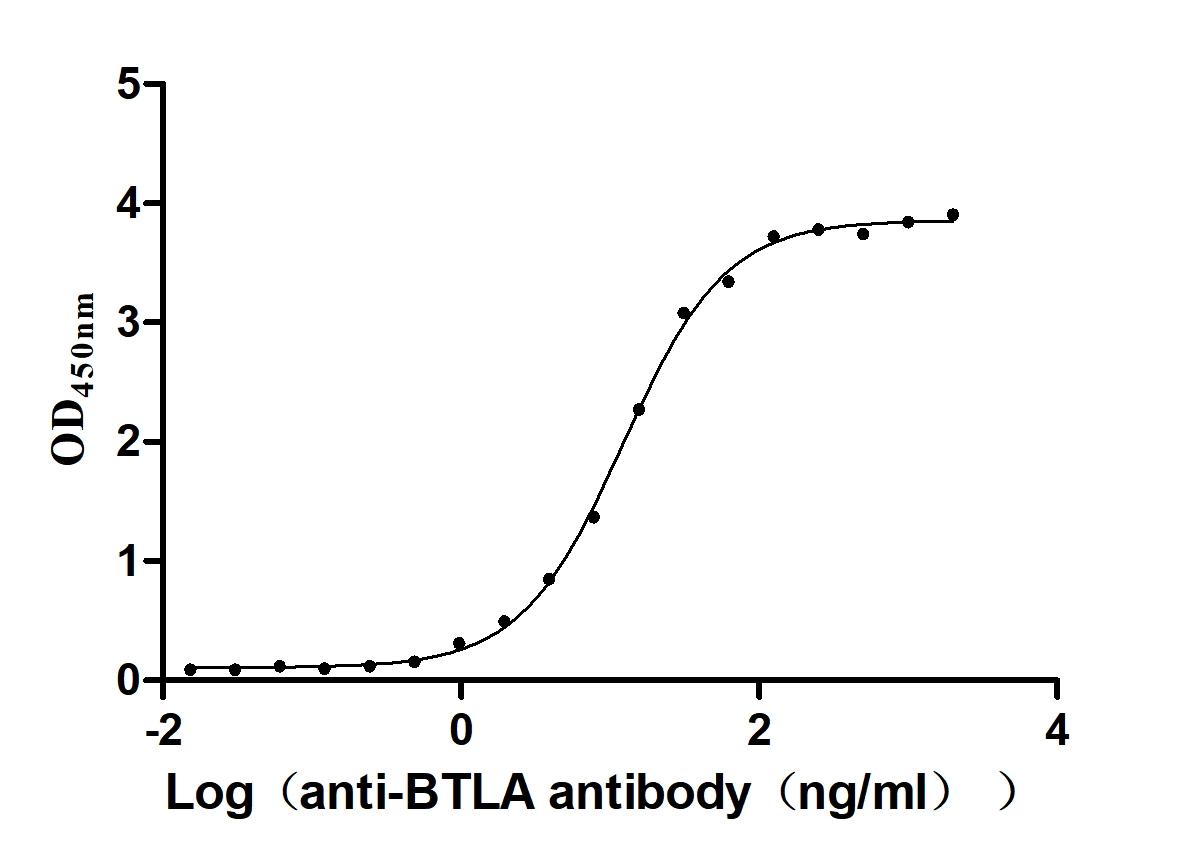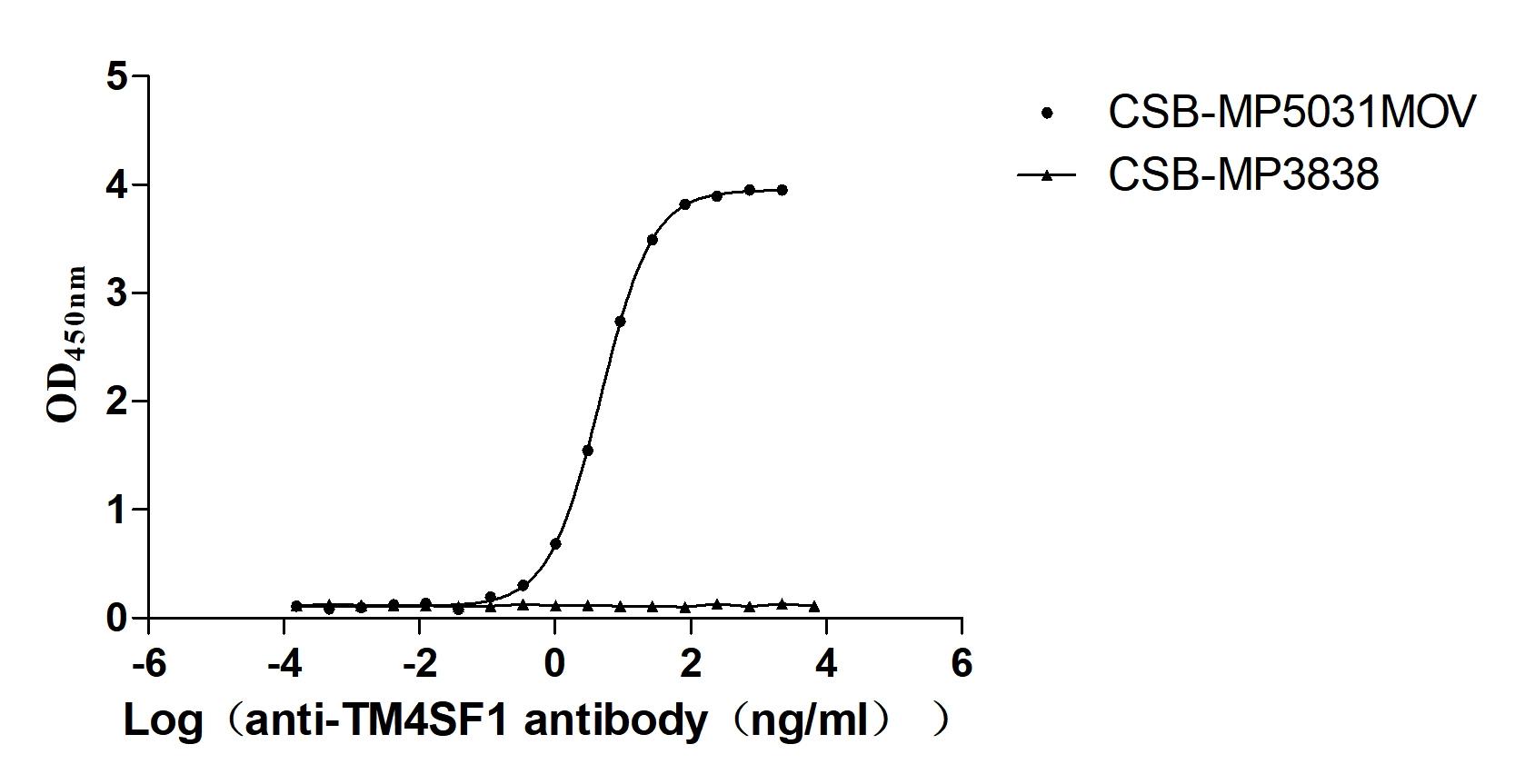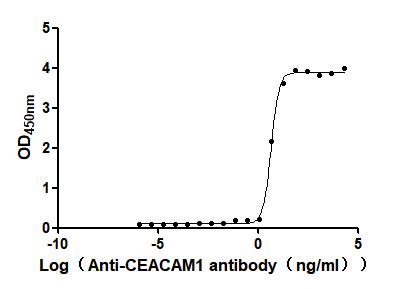Recombinant Human Complexin-2 (CPLX2)
-
中文名稱:Recombinant Human Complexin-2(CPLX2)
-
貨號:CSB-YP761369HU
-
規(guī)格:
-
來源:Yeast
-
其他:
-
中文名稱:Recombinant Human Complexin-2(CPLX2)
-
貨號:CSB-EP761369HU-B
-
規(guī)格:
-
來源:E.coli
-
共軛:Avi-tag Biotinylated
E. coli biotin ligase (BirA) is highly specific in covalently attaching biotin to the 15 amino acid AviTag peptide. This recombinant protein was biotinylated in vivo by AviTag-BirA technology, which method is BriA catalyzes amide linkage between the biotin and the specific lysine of the AviTag.
-
其他:
-
中文名稱:Recombinant Human Complexin-2(CPLX2)
-
貨號:CSB-BP761369HU
-
規(guī)格:
-
來源:Baculovirus
-
其他:
-
中文名稱:Recombinant Human Complexin-2(CPLX2)
-
貨號:CSB-MP761369HU
-
規(guī)格:
-
來源:Mammalian cell
-
其他:
產(chǎn)品詳情
-
純度:>85% (SDS-PAGE)
-
基因名:
-
Uniprot No.:
-
別名:921 L; Complexin 2; Complexin II; Complexin-2; Complexin2; ComplexinII; CPLX 2; Cplx2; CPLX2_HUMAN; CPX 2; CPX II; CPXII; Hfb1; Synaphin 1; Synaphin-1; Synaphin1
-
種屬:Homo sapiens (Human)
-
蛋白長度:full length protein
-
表達區(qū)域:1-134
-
氨基酸序列MDFVMKQALG GATKDMGKML GGEEEKDPDA QKKEEERQEA LRQQEEERKA KHARMEAERE KVRQQIRDKY GLKKKEEKEA EEKAALEQPC EGSLTRPKKA IPAGCGDEEE EEEESILDTV LKYLPGPLQD MFKK
-
蛋白標簽:Tag?type?will?be?determined?during?the?manufacturing?process.
The tag type will be determined during production process. If you have specified tag type, please tell us and we will develop the specified tag preferentially. -
產(chǎn)品提供形式:Lyophilized powder
Note: We will preferentially ship the format that we have in stock, however, if you have any special requirement for the format, please remark your requirement when placing the order, we will prepare according to your demand. -
復溶:We recommend that this vial be briefly centrifuged prior to opening to bring the contents to the bottom. Please reconstitute protein in deionized sterile water to a concentration of 0.1-1.0 mg/mL.We recommend to add 5-50% of glycerol (final concentration) and aliquot for long-term storage at -20℃/-80℃. Our default final concentration of glycerol is 50%. Customers could use it as reference.
-
儲存條件:Store at -20°C/-80°C upon receipt, aliquoting is necessary for mutiple use. Avoid repeated freeze-thaw cycles.
-
保質(zhì)期:The shelf life is related to many factors, storage state, buffer ingredients, storage temperature and the stability of the protein itself.
Generally, the shelf life of liquid form is 6 months at -20°C/-80°C. The shelf life of lyophilized form is 12 months at -20°C/-80°C. -
貨期:Delivery time may differ from different purchasing way or location, please kindly consult your local distributors for specific delivery time.Note: All of our proteins are default shipped with normal blue ice packs, if you request to ship with dry ice, please communicate with us in advance and extra fees will be charged.
-
注意事項:Repeated freezing and thawing is not recommended. Store working aliquots at 4°C for up to one week.
-
Datasheet :Please contact us to get it.
相關產(chǎn)品
靶點詳情
-
功能:Negatively regulates the formation of synaptic vesicle clustering at active zone to the presynaptic membrane in postmitotic neurons. Positively regulates a late step in exocytosis of various cytoplasmic vesicles, such as synaptic vesicles and other secretory vesicles. Also involved in mast cell exocytosis.
-
基因功能參考文獻:
- This study demonstrated that complexin-II differentially influence cognitive function in early and late stages of Alzheimer's disease. PMID: 27866231
- Then results indicated that CPLX2 may be involved in the etiology of schizophrenia and one of its potential biological mechanisms by studying the effects of CPLX2 risk variants on working memory load-dependent neural activity in a frontoparietal network. PMID: 25297695
- These results suggested that CPLX2 participated in synaptic taste transduction. PMID: 25692331
- CPLX2 rs1366116*T variant represents a risk factor of schizophrenia, and , at the same time, CPLX2 rs3892909*T variant is protective against schizophrenia (study performed in Armenians). PMID: 25564026
- role in synaptic vesicle exocytosis PMID: 12058476
- altered immunoreactivity of this protein in prefrontal cortex in severe mental illness PMID: 12082566
- in huntingtin mutation, the decline in neurotransmitter release is a direct consequence of complexin II depletion PMID: 12807877
- In schizophrenia, complexin II was reduced in dorsolateral prefrontal cortex and superior temporal cortex. The impairment of synaptic transmission may contribute to the dysfunction of cortical neural circuits that characterises the disorder. PMID: 15653259
- CX2 level increased between the fetal and the 6-10 years groups and then plateaued PMID: 18240322
顯示更多
收起更多
-
亞細胞定位:Cytoplasm, cytosol. Cell junction, synapse, presynapse. Nucleus. Perikaryon.
-
蛋白家族:Complexin/synaphin family
-
組織特異性:Nervous system. In hippocampus and cerebellum, expressed mainly by excitatory neurons. Down-regulated in brain cortex from patients suffering from Huntington disease, bipolar disorder or major depression. Down-regulated in cerebellum from patients with sc
-
數(shù)據(jù)庫鏈接:
Most popular with customers
-
Recombinant Human Pancreatic adenocarcinoma up-regulated factor (ZG16B) (Active)
Express system: Mammalian cell
Species: Homo sapiens (Human)
-
Recombinant Human Epithelial discoidin domain-containing receptor 1 (DDR1), partial (Active)
Express system: Mammalian cell
Species: Homo sapiens (Human)
-
Recombinant Macaca fascicularis lymphocyte antigen 6 family member G6D (LY6G6D) (Active)
Express system: Yeast
Species: Macaca fascicularis (Crab-eating macaque) (Cynomolgus monkey)
-
Recombinant Rat Gastric inhibitory polypeptide receptor (Gipr), partial (Active)
Express system: Mammalian cell
Species: Rattus norvegicus (Rat)
-
Recombinant Macaca fascicularis C-type lectin domain family 4 member C(CLEC4C), partial (Active)
Express system: Mammalian cell
Species: Macaca fascicularis (Crab-eating macaque) (Cynomolgus monkey)
-
Recombinant Human B- and T-lymphocyte attenuator(BTLA), partial (Active)
Express system: Mammalian cell
Species: Homo sapiens (Human)
-
Recombinant Macaca fascicularis Transmembrane 4 L6 family member 1 (TM4SF1)-VLPs (Active)
Express system: Mammalian cell
Species: Macaca fascicularis (Crab-eating macaque) (Cynomolgus monkey)
-
Express system: Mammalian cell
Species: Homo sapiens (Human)


